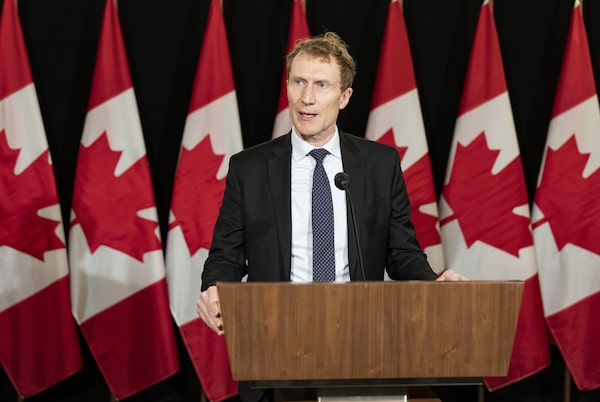
Minister of Immigration, Refugees and Citizenship Marc Miller speaks to the media during the federal cabinet retreat in Montreal on Jan. 22.Christinne Muschi/The Canadian Press
Immigration Minister Marc Miller is preparing measures to ensure that the federal government’s new cap on international student visas does not lead to a sharp drop in the number of francophones studying in Canada.
Mr. Miller announced the cap earlier this week, saying there would be “no further growth” in the number of international students in the country for the next two years. This would mean cutting the number of new permits issued this year by about 35 per cent, compared to 2023.
What to know about Ottawa’s two-year cap on international student visas, and other measures
As of December, official figures showed that slightly more than one million people held Canadian student visas. Ottawa had not previously set an upper limit, leading to concern that the volume of students has had an impact on housing affordability in some areas.
But the minister’s office said Thursday that he is concerned the cap could lead English-speaking provinces to target francophone institutions, resulting in a disproportionate reduction in the number of French-speaking students in Canada, including those from African countries, such as Côte d’Ivoire.
One option the government is considering is the creation of a separate visa stream for francophone students.
“We are looking for mechanisms to minimize the impact on francophone institutions outside Quebec and on francophones in countries where we already have a low acceptance rate,” said Aïssa Diop, Mr. Miller’s director of communications.
The cap will be applied across provinces on a per-capita basis, and Ontario, which has more foreign students than others, may have to cut its intake of them by about 50 per cent.
Ms. Diop said the provinces, which will decide how their allocated numbers of study permits will be divided between institutions, have a role to play in minimizing the impact on francophone universities and colleges.
There are a number of French-speaking universities outside Quebec in Canada, including l’Université de Moncton in New Brunswick.
Emmanuel Aito, the dean of the University of Regina’s French-speaking faculty, La Cité universitaire francophone, said he wants more information on the potential impact of the cap on international student admissions.
He added that international students enhance the academic and cultural life of La Cité, and that he hopes to ensure they continue to have a place at the institution.
Claire Francoeur, director of communications at Université de l’Ontario français in Toronto, which has an even split between international students and francophone Canadian students, said the university is hoping French speakers are not disproportionately affected by the policy change.
“We are hoping that the francophone community will be respected in this,” she said.
Ontario colleges accuse Ottawa of creating ‘chaos’ for international students with new cap
The cap is the latest of several reforms intended to limit inflows of international students and curb abuses of study permits.
In December, Mr. Miller announced that international students who want to come to Canada will need to prove they have more than $20,000, in addition to money for tuition and travel, in order to qualify for study permits – more than twice as much as is currently required. The increase does not apply to Quebec, which has its own threshold that it raises periodically.
The Quebec government is putting pressure on Ottawa to do more to protect French speakers.
At a news conference on Thursday, Quebec Premier François Legault said he wanted to see a reduction in an influx of refugees to the province. They include English speakers and other non-francophones.
He wrote to Prime Minister Justin Trudeau earlier this week asking him to clamp down, saying that despite the closing of the Roxham Road border crossing with United States, asylum seekers are increasingly arriving at airports.
Mr. Legault said the number of refugees is putting pressure on housing, health care and education in the province.